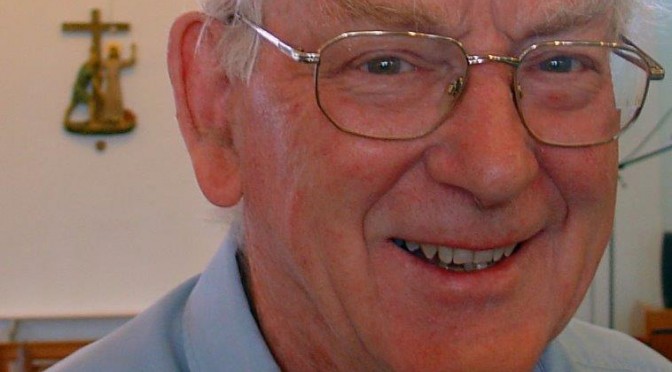
Speaking Personally – Mike Hornsby-Smith
Where do you think your commitment to justice and peace comes from?
I can still recall Fr. McEwan at the Salesian College, Battersea, teaching us about Rerum Novarum in the Fourth Form. An early interest in politics came from my aunt who was a government minister. When canvassing in Attercliffe when I was a student at Sheffield I was enormously impressed by the extraordinary politeness of people who seemed to be deprived. In my first job at Battersea College of Technology I was ‘invited’ to become Branch Secretary of the Association of Teachers in Technical Institutions and remained so long after we moved to Guildford as the University of Surrey. There a postgraduate student, Fr. Bob Bogan, invited me to become a member of the A&B diocesan Justice and Peace Commission. To my great surprise the then Bishop Cormac invited me to chair the commission and I did so for six years. I was invited to join the Committee of the Catholic Institute for International Relations (now Progressio) for six years and I went on a three-week CAFOD exposure trip to the Philippines in 1984. Fr. Michael McGlade returning from Chile brought a healthy breath of liberation theology to our parish for a few years. Over the years I went on major demonstrations such as the protest against war in Iraq, the ‘Make Poverty History’ demonstration in Edinburgh, and the climate change demonstration before Copenhagen. I was briefly a member of a Pax Christi working party. I was pleases to become a patron of Housetop which campaigns for women priests. In sum, my call was not a Damascus experience so much as a gradual learning experience. The Second Vatican Council was a major inspiration as were the many friends I made in the justice and peace movement.
What for you are the most important areas of concern today?
Three issues strike me as particularly relevant at this time. The world is changing and we need to recognise the reality of globalisation and its implications for the changing labour market. We also need to reinterpret the nature of security threats in the world today. So firstly, the steady increase in inequality since the 1980s must be tackled if social cohesion is to be retained. The recent books by the French economist, Thomas Piketty, and by Anthony Atkinson, point to the need for comprehensive responses. Pope Francis’ Evangelii Gaudium has some pointed suggestions to follow. Secondly, the issue of global warming is one which will determine our response to intergenerational injustices and we need to respond as individuals, campaigning groups, nations and international organisations. Pope Francis’ Laudato Si’ puts the issue into the context of respect for God’s creation. Thirdly, I believe we need to reappraise the place of the UK in the 21st century. Our foreign and defence policies must reflect the current and projected dangers and we need to recognise that we must work collaboratively with other nations, particularly those in the EU. We need to work collaboratively to reform major international institutions such as the UN, IMF and World Bank. Nuclear disarmament and a reduction of arms production must be actively promoted.
What sustains you in your commitment?
The commitment of activists is enormously inspiring and supportive. I recall meeting Bruce Kent, Pat Gaffney and members of Pax Christi on the anti Iraq War demonstration, Kevin Burr in Edinburgh for the ‘Make Poverty History’ demonstration, and Fr. Owen Hardwicke before the Copenhagen meeting on climate change. In the past colleagues on the diocesan justice and peace commission and CIIR (Progressio) committee, such as Mildred Nevile and Ian Linden, were inspirational and encouraging. For nearly forty years I have been a member of my parish Justice and Peace group. It has usually been a ‘hard slog’ but, in spite of much indifference and occasional hostility in the parish, the perseverance of our handful of members has been inspirational. We have a routine of welcoming the parish diversity on Racial Justice Sunday, organising a 10% collection of Christmas spending for chosen charities and a ‘write for rights’ campaign around Christmas, then in the New Year Peace Sunday and Poverty and Homelessness Sundays. This year we are focussing on environmental issues and Pope Francis’ encyclical Laudato Si’. Of course, absolutely fundamental has been the teaching of Vatican II, especially Gaudium et Spes and Lumen Gentium and Catholic Social Teaching since.
What are your hopes for a Church like ours for the 21st century?
Primarily that it will be a ‘People of God’ Church and won’t regress to a pre-Vatican Church and that clericalism will be replaced by collaborative ministries. I also hope that there will be a growing concern to teach parishioners some of the key characteristics of Catholic social teaching in the weekly homilies. Issues such as the intrinsic dignity of each human being, the importance of the common good, solidarity, subsidiarity, and the preferential options for the poor and for non-violence are rarely taught. Yet recent teaching of the popes since Vatican II are rich with the implications of bringing closer God’s kingdom on earth as in heaven. Pope Francis has been inspirational but how many know he said ‘no to an economy of exclusion; no to the new idolatry of money; no to a financial system which rules rather than serves; and no to the inequality which spawns violence’? Somehow we need to enthuse young Catholics with a new social vision of being a follower of Jesus. Finally, I hope there will be a growing awareness that we need to address gender and generational injustices.
Personal Note: Michael P. Hornsby-Smith is Emeritus Professor of Sociology at the University of Surrey and the author of An Introduction to Catholic Social Thought (Cambridge University Press, 2006) and a simplified version in Following Jesus as Pilgrims, Servants and Prophets: Letters to my Grandchildren (Fastprint Publishing, 2014).
7 August 2015.



